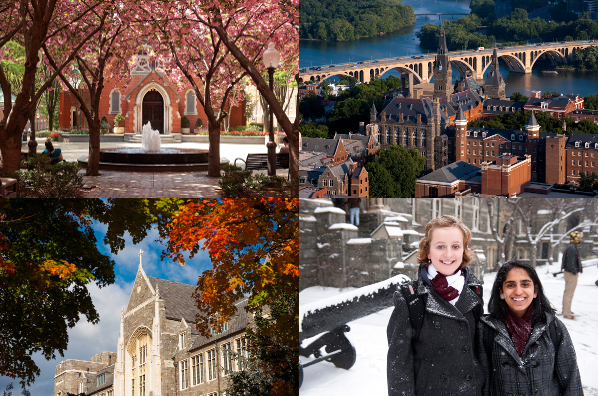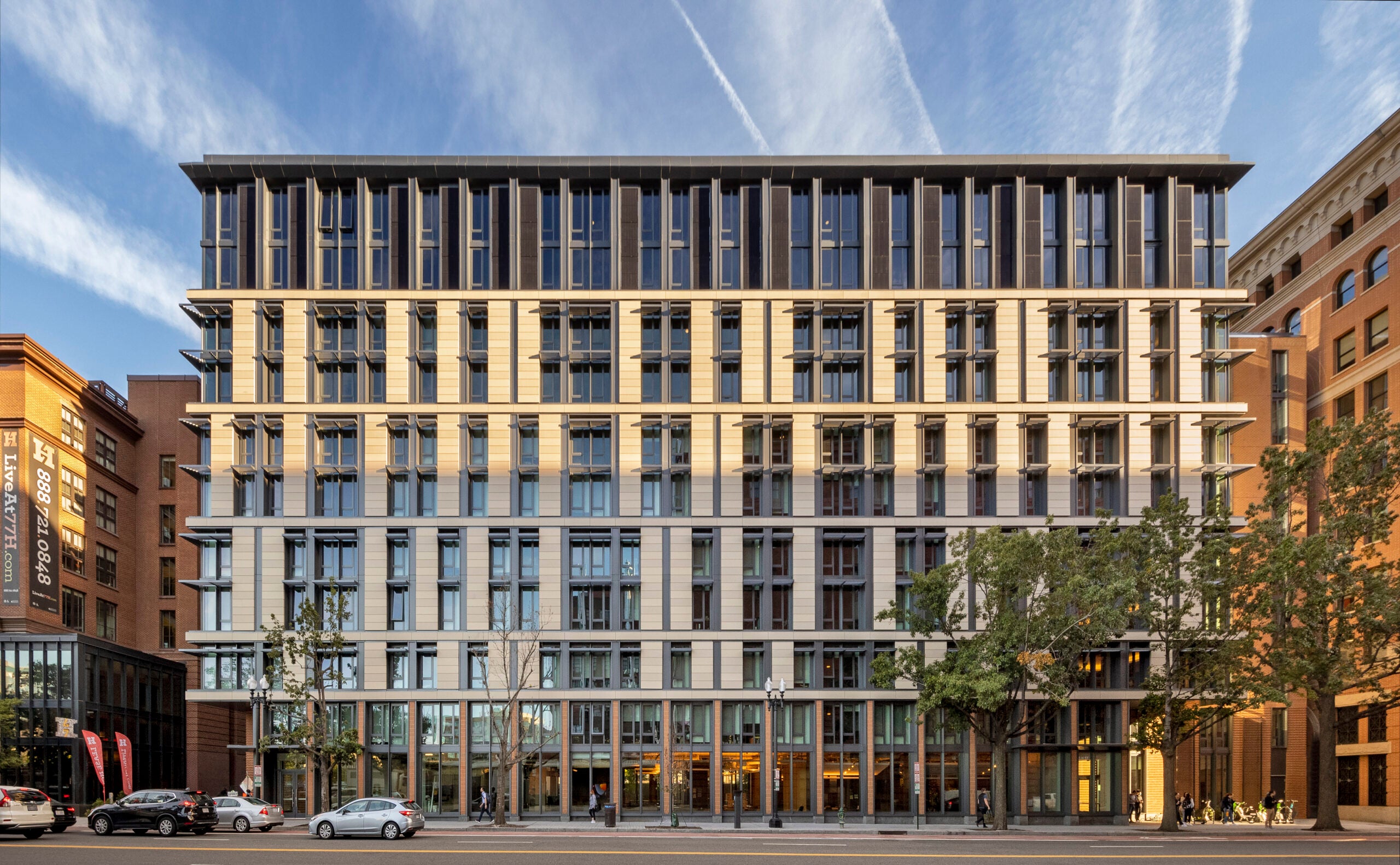We’ve outlined key information here to help you get the most out of life as a graduate student in the Washington, DC, area. You’ll find details about housing, transportation, graduate student spaces, dining opportunities and seasons in DC below.
Welcome to Washington, DC!
Washington, DC, is one of the best cities in the world to be a student! With a mass of scholars research agencies, think tanks, international government organizations, and museums, DC is home to a vibrant academic culture. The international population allows residents to meet people from across the world and experience elements of a variety of cultures. As a hub for students and young professionals, there is always something to do. Washington, DC, boasts active music, art, food, sports, and theater scenes. Georgetown students take advantage of all that the DC area has to offer, as well as the many cultural, academic, and social events hosted by the university.
Housing
Housing Guide
Find tips for your housing search and more information about living in and around DC in our Graduate Student Housing Guide.
Georgetown has two offices primarily dedicated to housing for graduate and off-campus students: the Office of Residential Living and the Office of Neighborhood Life.
The Office of Residential Living maintains resources for on- and off-campus students. In Fall 2022, they began offering university housing for graduate and select undergraduate students at 55 H St. NW. This residence hall offers new studio and 2-, 3- and 4-bedroom apartments; all units are fully furnished and feature full kitchens and washer-dryers; utilities and usage fees are included in the price of rent. Living at 55 H St. means you will get to live, study, work and explore at the heart of the nation’s capital.
The Office of Neighborhood Life tries to make living off-campus more manageable and serves as a liaison between the city and students. Their office can assist with graduate students leasing private apartments, rooms, and other housing in the communities surrounding Georgetown University. In June, they hose an Off-Campus Housing Fair that gives students the opportunity to stay for free on campus for one weekend to conduct a housing search. They also manage the Off-Campus Housing Listings to help find rental units and match potential roommates.
Georgetown students often live in the neighborhoods listed below.
- Ballston, VA
- Clarendon, VA
- Courthouse, VA
- Crystal City, VA
- Dupont
- Glover Park
- Foxhall
- Georgetown
- Palisades
- Pentagon City, VA
- Rosslyn, VA
Students also live in other neighborhoods, typically along Metro subway lines, including the Red Line in the northwest (NW) quadrant of Washington, DC, and the Blue and Yellow Lines in Arlington and Alexandria, Virginia, located just across the Potomac River from the main Georgetown University campus.
Transportation
The Washington Metropolitan Area Transit Authority (WMATA) operates the region’s public transportation systems and helps Georgetown students travel throughout the DC, Maryland and Virginia suburbs.
While there is no metro station in Georgetown, the university operates free shuttles to the Rosslyn and Dupont Circle metro stations, the Law Center, Downtown Campus (55 H St. NW and 640 Massachusetts Ave.) and the Arlington Loop route. Many WMATA bus lines also service Georgetown: the G2, 30N, 30S, 31, 33, 38B, the Dupont-Rosslyn Circulator, and the Georgetown-Union Station Circulator.
Washington, DC, is often rated one of the best cities in the country for people who do not own a car, and the university is a short walk from close to 100 restaurants and eateries, more than 100 retail stores, several parks including a waterfront on the Potomac River, and entertainment. Most other neighborhoods are walkable and accessible by metro or bus.
This is a bicycle-friendly city, each year laying miles of new bicycle lanes and expanding its successful bikeshare program, Capital Bikeshare.
Parking can be a challenge in the Georgetown area. The university has a paid parking garage for commuting students, staff, and visitors. While some students choose to drive, most will come to campus using some form of public transportation or walking/bicycling. Most apartment complexes have parking garages or lots and street parking passes are available to local residents.
Graduate Student Spaces
As a graduate student, you can find multiple spaces to relax and study during your time in a master’s or doctoral program nestled in the Car Barn building and across Main Campus. Looking for somewhere quiet to study? Want to have access to coffee shops and the university bookstore?
Learn more about the graduate student spaces you can access while you’re here.
- Car Barn – 3520 Prospect St, NW
- Room 100* – Open lounge space accessible to graduate and undergraduate students
- Room 220 – GOCard Access Only
- Room 410 – Quiet Study Lounge; GOCard Access Only
- Healey Family Student Center – New South Building
- Great Room
- Group meeting rooms
- Open study spaces
- Lauinger Library – Graduate Study Lounges
- First Floor
- Midnight Mug Coffeehouse (Second Floor)
- Fourth Fourth
- Leavey Center
- Open lounge space for all students
- Uncommon Grounds Coffeehouse
- Campus Bookstore
- Food Court, and more!
* = This space has a limited number of free daily use lockers.
There are several other library locations that graduate students have access to across the Main, Medical and Law Center Campuses:
- Bioethics Research Library – Main Campus, Healy Hall 102
- Blommer Science Library – Main Campus, Reiss Science Building 3rd Floor
- Dahlgren Memorial Library – Medical Campus, Preclinical Science Building GM-7
- Edward Bennett Williams Law Library – Law Center, 111 G Street NW
Dining
You will eat well in Washington, DC. Well-traveled Washingtonians have a taste for the international bringing variety and quality to the restaurant scene. You can try everything from Peruvian to Laotian, and West African to Italian in neighborhoods across the District.
For quick meals, there are a variety of fast casual restaurants, some of which are local to the area. One such restaurant, Sweetgreen, was founded by Georgetown alumni!
Restaurants are more concentrated in some neighborhoods, particularly ones with nightlife. Adams Morgan, Dupont, and the U Street corridor are popular areas to enjoy both cuisine and nightlife. You can start the night with a concert or show, enjoy dinner, get dessert and finish with conversations, events or dancing.
Seasons in DC
Living in Washington, DC, you get to experience all four-seasons. Spring and fall are temperate, summer is hot and humid, and winter is cold.

Images of all four seasons at Georgetown University in Washington, DC; spring (top left), summer (top right), fall (bottom left), winter (bottom right)
Featured above are seasonal photos of spring, summer, fall and winter at Georgetown University. Extreme rain and snow are unusual. July and August are the hottest months of the year while January is the coldest.
Extreme temperatures greater than 100°F (38°C) or lower than 20°F (-7°C) are rare.
Additional Tips
Explore additional tips on Living in DC.
